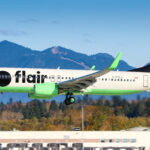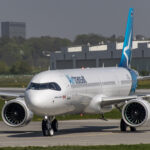Canary Islands-based Spanish airline Binter and energy and chemical company Cepsa have announced a joint commitment to boost the reduction of CO2 emissions in airline operations.
The agreement between Binter and Cepsa involves the development and production of sustainable aviation fuels (SAF) from recycled feedstock such as used cooking oil or animal fats. SAF can emit up to 80% less carbon dioxide relative to conventional fossil fuels.
«Through this alliance, other energy alternatives, such as renewable hydrogen and electrification, will also be developed for the airline’s ground fleets (supply vehicles, baggage loading, and unloading operations, aircraft assistance, etc.),» says a statement issued by Binter.
Binter’s president, Rodolfo Núñez, assured that «with this alliance, we are taking a very important step in Binter’s objective of providing air transport services in the most sustainable way possible. For this, it is essential to promote the consumption of new fuels with a low environmental impact. And, we will soon be able to start applying to our flights, thanks to the joint work with Cepsa».
Cepsa is one of the main suppliers of aviation fuel in Spain, particularly in the Canary Islands. The company also has experience in the production of SAF in its industrial centers. Hence this positions it as an important partner of Binter in this initiative.
Director’s words:
Pierre-Yves Sachet, Director of Mobility and New Commerce at Cepsa, emphasized that «at Cepsa we work to provide innovative solutions that promote sustainable mobility. This agreement is a good example. With it we also contribute to the competitiveness of the tourism sector in Spain, being the Canary Islands its main reference».
The agreement between the companies is aligned with the European Commission’s Fit for 55 package of measures. This includes the ‘RefuelEU Aviation’ initiative, which boosts the supply and demand of SAF for aviation in the countries that make up the European Union, to reach use of at least 2% in 2025, 5% in 2030 and 63% in 2050.
So far, only 50% of UF is certified for use on commercial flights. However many aviation stakeholders worldwide are working hard to achieve, in the short term, authorization to operate with all sustainable aviation fuel.
See also: Binter inaugurates flights between Gran Canaria and A Coruña
See also: Binter launches promotion with tickets from 25 euros













